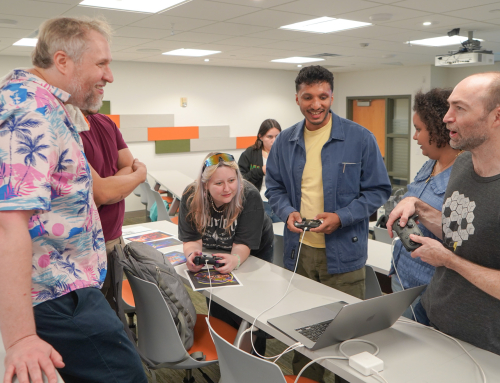University of Miami earned a ranking on The Princeton Review’s just-published list saluting the top 25 graduate schools to study game design for 2017.
This is the School of Communication Interactive Media M.F.A. program’s third appearance on the prestigious list since its inception in 2013. The M.F.A. program was ranked No. 25 this year.
The Princeton Review chose the schools based on a survey it conducted in 2016 of 150 institutions offering game design coursework and/or degrees in the United States, Canada, and some countries abroad.
“I think one of the bigger selling points right now is NERDLab – New Experience Research & Design Lab,” said Clay Ewing, assistant professor for the Department of Cinema and Interactive Media. “We have nine students working in the lab on various projects. We don’t just do games, we do applications as well. We get students heavily involved.”
The 40-question survey asked schools to report on everything from their academic offerings and faculty credentials, to their graduates’ starting salaries and employment experience. Among criteria The Princeton Review weighed to make its selections: the school’s academics, facilities, career services, and technology.
“It has long been our mission to help students find – and get into – the schools best for them, ” said Robert Franek, Princeton Review editor-in-chief. “For students aspiring to work in the burgeoning field of game design, we strongly recommend the University of Miami and each of the other schools that made our 2017 lists. These are truly the ‘cream of the crop’ institutions from which to launch a career. Their faculties are outstanding. Their facilities are awesome. And their alumni include legions of the industry’s most prominent game designers, developers, artists, and entrepreneurs.”
University of Miami Interactive Media graduate students have won notable awards in the past four years, including an IndieCade Official Big Game Selection for Atlantis in 2014 and Gold and Silver International Serious Play Awards for their games Unsavory and Zoo Rush.
“The skills you learn in game design are applicable to more than games,” said Ewing. “Our interactive program curriculum is broad and looking at interactivity through the lens of game design is very important for systems design.”
For the fourth consecutive year, The Princeton Review teamed up with PC Gamer, a monthly magazine published by Future plc as its reporting partner on this project.
The Princeton Review developed its Top Schools To Study Game Design project in 2009 with assistance from a national advisory board that helped design the survey instrument and methodology. Board members included administrators and faculty from respected game design programs, and professionals from some of the top gaming companies.







